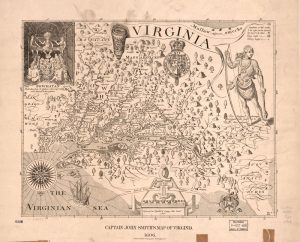Core Program 2019–20
- Browse list of Core Programs, 1991–.
2019–20
Contested Foundations: Commemorating the Red Letter Year of 1619
—organized by Brenda E. Stevenson (University of California, Los Angeles) and Sharla M. Fett (Occidental College)

The year 1619 was designated as the red-letter year in Virginia, the first permanent colony in British North America, for three reasons—it marked the beginning of a representative government; the arrival of captive African laborers; and the initiation of a successful plan to encourage permanent family development through the importation of English women. It was on June 29, 1619, that Sir George Yeardley, governor general of the colony, convened a legislative assembly consisting of persons sent as representatives by its free male residents. It was the first such legislative assembly in the British colonial New World. Two months later, the first shipment of Africans arrived at Point Comfort on the southern coast of Virginia, a foreshadowing of the hundreds of thousands of African laborers who would eventually arrive and help to transform Virginia, and several other colonies, into race-based-slave economies. That same year, the Virginia Company of London began a concerted effort to recruit “respectable [English] women” to the colony so that, in the words of one Company officer, they could “‘make wifes to the inhabitants and by that meanes to make the men there more settled and less moveable.” The combination of these efforts, all meant to enhance the lives of the colonial male elite, marked the beginning of a true settler colony for Britain in North America. This beginning came with grim implications for the indigenous populations the British encountered. These experiments in governance, settler colonialism, and a racialized economy also proved to be the characteristic underpinnings of our independent nation two hundred and fifty years later. 1619 was indeed the red-letter year of British America’s 17th century!
This core program, marking the 400th anniversary of this notable year, encompasses three conferences, each of which will address one of the three seminal events of 1619 within the geopolitical, economic, and social/cultural contexts of 17th– and 18th-century North America. Across these conferences, we will also consider 1619’s impact on the nation’s eventual character. The British, of course, were not the first Europeans to explore, establish permanent settlements, import African slaves, or create governing structures in North America. The French and the Spanish made several forays into the southern, gulf, and western regions before the British. Therefore, the program will also encompass French and Spanish forays into the southern, gulf, and western regions.
The first conference concerns the 1619 forced migration of Africans to colonial Virginia. Scholars will discuss the arrival, distribution, and resistance of African laborers among British settlers and those of other European colonies in North America. Topics will include the creation of slave-based (African and indigenous) and slave trade influenced colonial economies, and the evolving legal and social implications of the growing cultural diversity of the colonial population. Collectively, presentations will encourage a discourse about Europeans of varied religious and linguistic backgrounds, diverse indigenous peoples, and multiple African ethnicities.
This second conference interrogates the ideals and realities of representative governance structures among British (and European) residents of North America from early colonization until the mid-18th century. There will be emphases on the barriers of race, gender and wealth to participation in these “representative” governments. Scholars will investigate the impact of the development of these colonial governments, and their legal institutions, on native peoples’ self-governance efforts and claims to the land vis-à-vis their settler neighbors. Furthermore, the conference will explore the contradictions inherent in the legal institutionalization of race-based chattel slavery, and the implications of this for the U.S.’s founding political constituents, documents, and institutions.
The third conference will focus on the arrival, coercion, commodification, and resistance of native, English, and African women. Scholars will consider colonial women’s labor, and their evolving status within families and communities. Discussions will engage the problems and possibilities of a colonial archive that has traditionally been constructed by, and centered on, a white, elite patriarchy to the exclusion and/or marginality of the voices and divergent experiences of women, Africans, native peoples, and non-elite whites.

